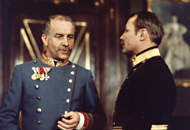Ulrich's three attempts at greatness
This first part is not related to my topic; however, I just talked with Prof. Tilghman and she said that if you have a point that you think is good but not necessarrily pertaining to the question of the week, it is okay to write about it. Basically if you have what you concider to be an epiphany about the book/Ulrich, go ahead and discuss it. And now on to my topic...
One thing I found very interesting about Ulrich was his three differnt attempts to become great. He discusses (now persuing mathmatics), that all the small works of commoners is far greater than that of the few heroes who do great works; however, his first two attempts to become great included him doing great works. His first attempt was with the military and his second was with architecture; both of these are classical (possibly synonymous with "qualities") ways of becomming great (Roman and Greek culture are known for being great, while also being linked with military conquest and great architecture). Also these first two attempt required Ulrich to do large great deeds more so than many small ones. Later on, with his third attempt, he changes to mathmatics which is not necessarily seen as one of the classical ways of becomming great. So it seems with his third attempt, Ulrich has decided on a way of becomming great that he sees as one of the most complex (per his discussion about how mathmatics governs the universe), but can be done in small, trivial steps (think of his watching and calculating the walking of pedestrians). As far as I can see, somewhere between his first two attempts and when he took up mathmatics, he decided that he would be a man with out "qualities" (where qualities refers to the status quo way of doing things).



1 comment:
I don’t know that I necessarily agree with your assessment that Ulrich “decides” to become a man without qualities. It seems to me that he sort of “evolves” into a role where he sees himself as lacking qualities because of his separation from the “qualities” of his father. He seems to approach mathematics with the idea that since mathematics governs the universe, if he can master mathematics then he can govern the universe, thus becoming a “great man.” His strange attitude toward the world around him is governed by his feeling of alienation from everything around him. This attitude is played out by both his relationship with Leona and his meeting with Bonadea. He knows that he is an outsider even in his own life.
Post a Comment